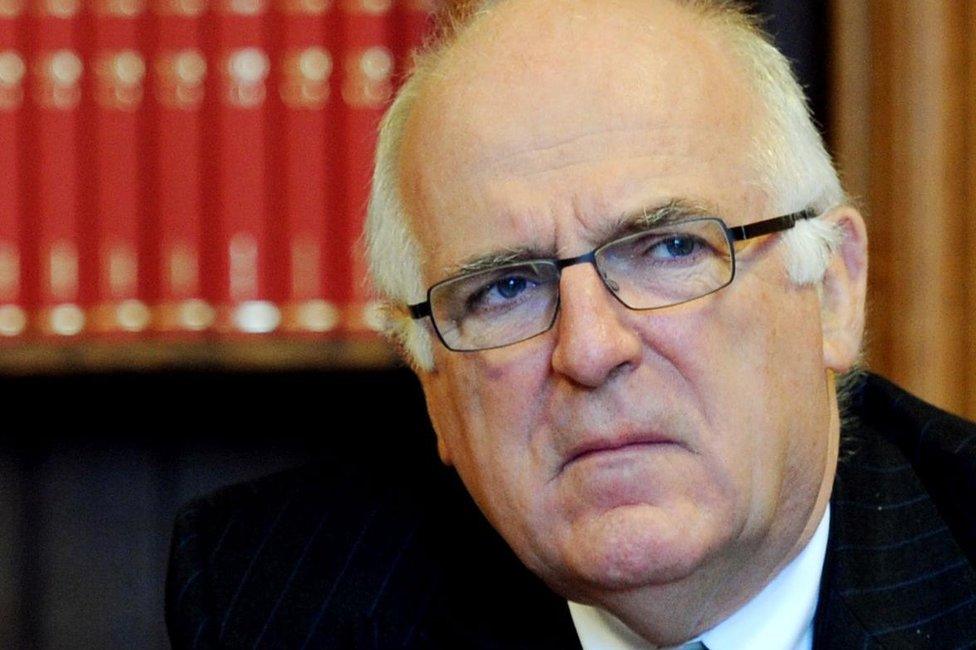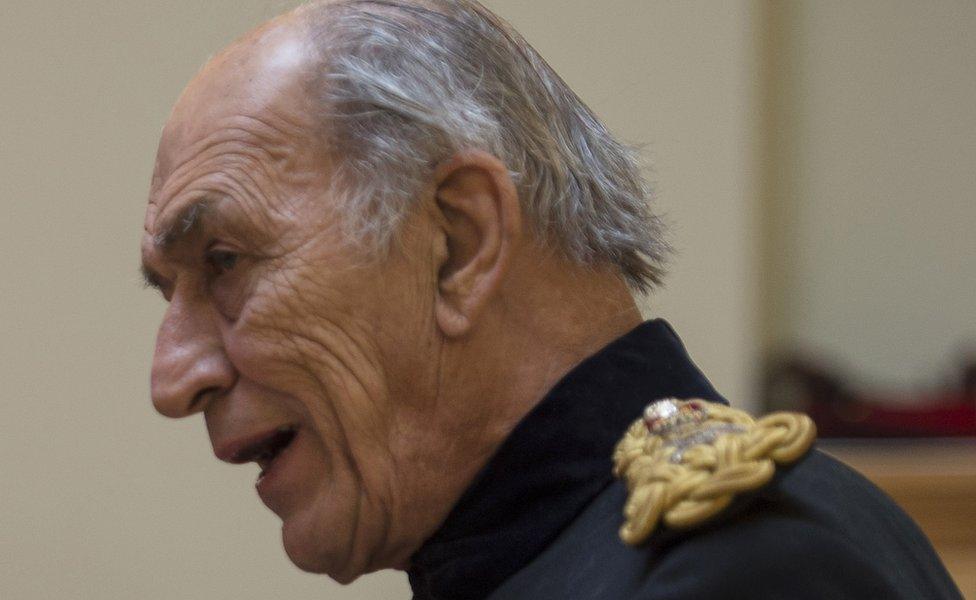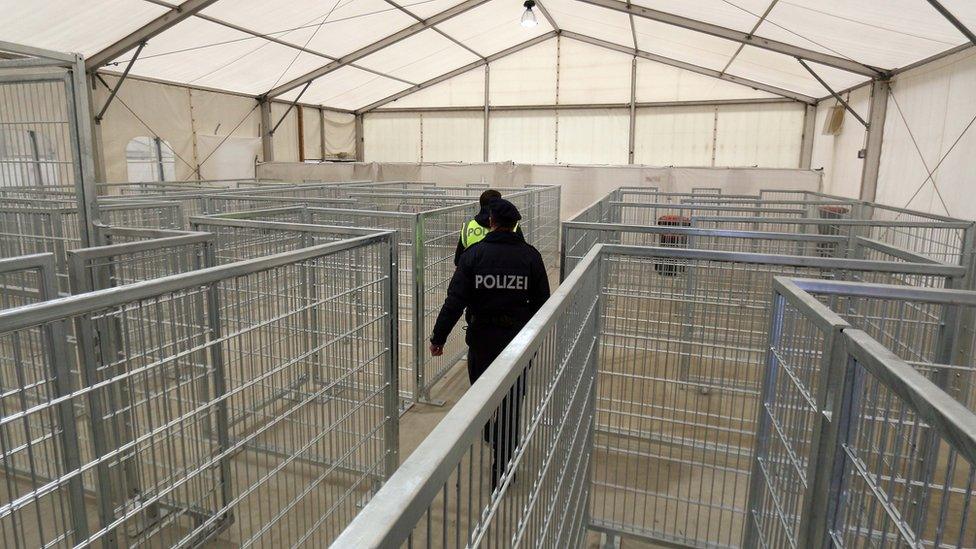Would the UK be safer in or out of the EU?
- Published

Would a European army spell the end for the British army?
People in the defence and security world express opinions about the United Kingdom's possible departure from the European Union that at times seem hard to reconcile.
Both sides agree key relationships from military cooperation through Nato to intelligence sharing via the so-called "five eyes" arrangements (the US, UK, Australia, Canada and New Zealand) would remain unchanged - but "remainers" and "outers" each insist their chosen path would be better for national security.
In recent months, the immigration crisis, and the possible use of migrant flows by terrorists to enter Europe illegally, have loomed large in the public imagination and Brexit debate.
Last month, Sir Richard Dearlove, the former chief of the Secret Intelligence Service (MI6), wrote Britain was such a big net contributor to European security it would hardly suffer from leaving the EU - other countries would still need it too much.
Furthermore, "Brexit would bring two potentially important security gains - the ability to dump the European Convention on Human Rights... and, more importantly, greater control over immigration from the European Union", Sir Richard wrote, external.

Sir Richard Dearlove believes Brexit would not harm UK security
While I have found many British military and intelligence experts who agree with Sir Richard that Nato defence arrangements and bilateral intelligence exchanges would probably continue unaltered by Brexit, the majority I've spoken to still express opposition to Britain leaving the EU.
They point to emerging security ties at the European level. Missing out on this, they argue, counts for more than the increased ability to control the movement of EU nationals that "outers" such as Iain Duncan Smith argue would make Britain more secure.
"We could lose our access to important datasets from 24 June if we vote to leave," says Nigel Inkster, formerly a senior MI6 officer, who is now a director at the International Institute for Strategic Studies.
He points to the EU's Passenger Name Record, external initiative, credit card information, and mobile phone call data, as exchanges governed by European agreements, and suggests Sir Richard, who stood down as chief of MI6 12 years ago, may be out of date on the subject of European counterterrorist collaboration.
'Pandora's box'
Gen Sir Mike Jackson, chief of the general staff from 2003 to 2006, argues worries about the application of the European Convention on Human Rights are misplaced, since it was not formulated by the European Union and Britain would remain a signatory even if it left the EU.
He says he opposes Brexit for bigger strategic reasons, among them that it "could open a Pandora's Box", a chain reaction of nationalism and instability in Europe. He is also concerned a vote to leave could trigger a second Scottish referendum, and further strategic risks.

Gen Sir Mike Jackson thinks Britain should stay in the EU for strategic reasons
The unknowns that might follow an exit can, of course, be offset against the imponderables of staying in.
Rear Adm Roger Lane-Nott, formerly Britain's senior submariner, is an example of that comparatively rare creature: a flag rank or general officer who favours leaving the EU. He believes few European countries are serious in their commitment to Nato and is deeply suspicious of the European Commission.
"Of considerable concern is talk of European army, European navy," he says. "If we stay in the EU, we could be forced to join against our will. We will never win a vote in the EU."
Gen Jackson argues he too would be concerned about a European military but that it will not happen, saying: "According to the prime minister, closer integration is now off the table."

Find out more:
Would the UK be safer in or out of the European Union? That is the subject of a BBC Newsnight special at 22:30 BST on Monday, 25 April, on BBC Two.
Follow the live blog from 22:00 BST for extra analysis, comment and background from the team.
Past Newsnight specials:

'Surrounded by herbivores'
A pro-Remain majority is even more pronounced when you speak to policy types in the UK's closest allies - the US and France - who almost universally express their disquiet about the possibility of Britain leaving the EU.
"It would be a catastrophe," says Francois Heisbourg, chairman of the International Institute for Strategic Studies and formerly a senior French official. "Without Britain we will be surrounded by herbivores."
His concerns hint at why so many European or US officials who would buy the argument that Britain's Nato or bilateral relationships would continue unaltered by Brexit still voice strong opposition or anxiety about the prospect.
"Having the UK in the European Union gives us much greater confidence about the strength of the transatlantic union" - US President Barack Obama
And when you drill down with them about why that is, they will tell you that they fear if Britain was no longer at the EU summit table, the remaining partners would be more likely to equivocate or take the easy path on issues such as Russian sanctions or the Iranian nuclear programme.
"Would Europe be more tempted to adopt an appeasement policy towards Moscow without Great Britain?" asks Dominique Moisi, co-founder of the French Institute for International Relations. "That might very well be the case, at least that's probably the thinking of [President] Vladimir Putin in Moscow - when you see that he wants very much… Great Britain to leave the EU."
American officials seem to share this view, that a strong partner on this side of the Atlantic, a nuclear-armed country at that, helps stiffen the collective resolve of Europe. This is one of the reasons for President Barack Obama's repeated appeals for the UK to remain within the EU.
Austrian example
In Austria, last week, I heard a strong appeal for Britain to remain in the EU.
Barely reported during recent weeks, a series of measures coordinated by that country to prevent migrants moving north through the Balkans by sealing off Greece has proven almost completely successful. "It worked," says Reinhold Lopatka, a former Austrian Foreign Minister and leader of the Austrian People's Party parliamentary faction.

An empty registration tent for migrants at the Austria-Slovenia border
Austria's actions to secure its borders brought accusations from some other parts of Europe it was flouting EU rules and the Schengen agreement on freedom of movement. Its government has said that if migration via the Libyan route continues, it will also block the Italian border used by people coming that way.
Mr Lopatka says the number of people seeking asylum in his country has fallen from 800 a day a few weeks ago to fewer than 100. The lesson, he says, is that "it's possible within the European Union to limit the number", and he urges Britain to remain in the EU, saying Austria's determination to control its frontiers and assert its sovereignty has not produced any groundswell for exit among its people.
From Austria to France or Germany, discussing the possibility of Brexit in recent weeks with those involved in defence and security, I have heard repeated expressions of concern.
Whether, as these discussions suggest, this sense the UK is an important net contributor to European security could have been leveraged to greater effect by Prime Minister David Cameron in his recent negotiations with continental partners, is another question entirely.
Would the UK be safer in or out of the European Union? was the subject of a BBC Newsnight special.